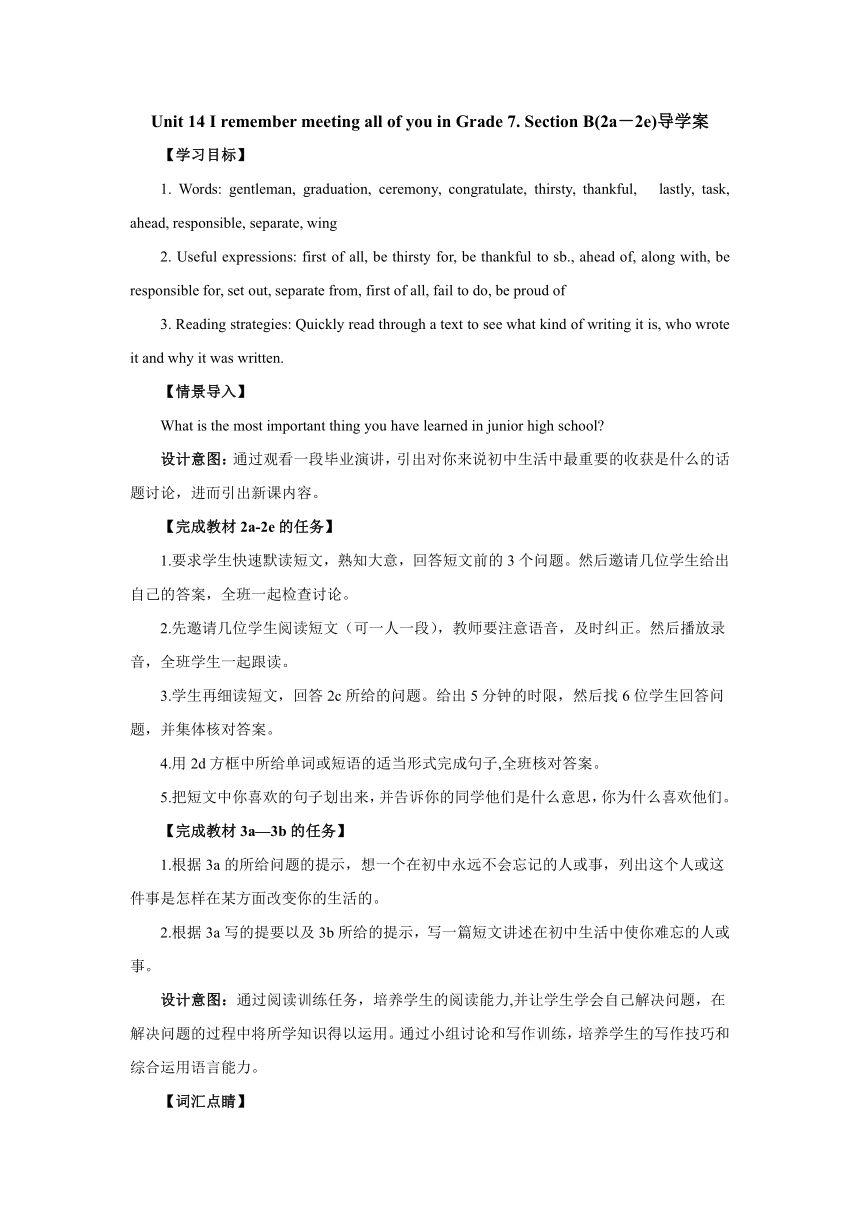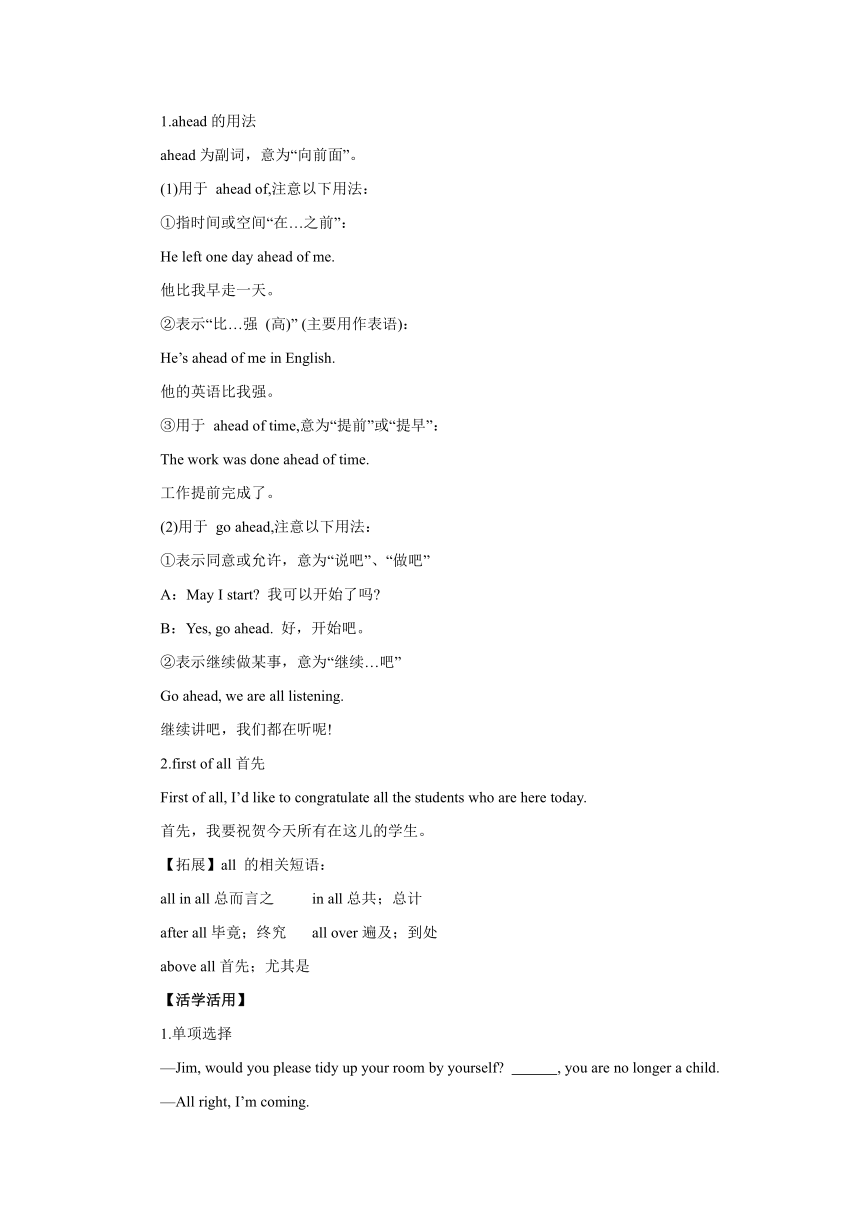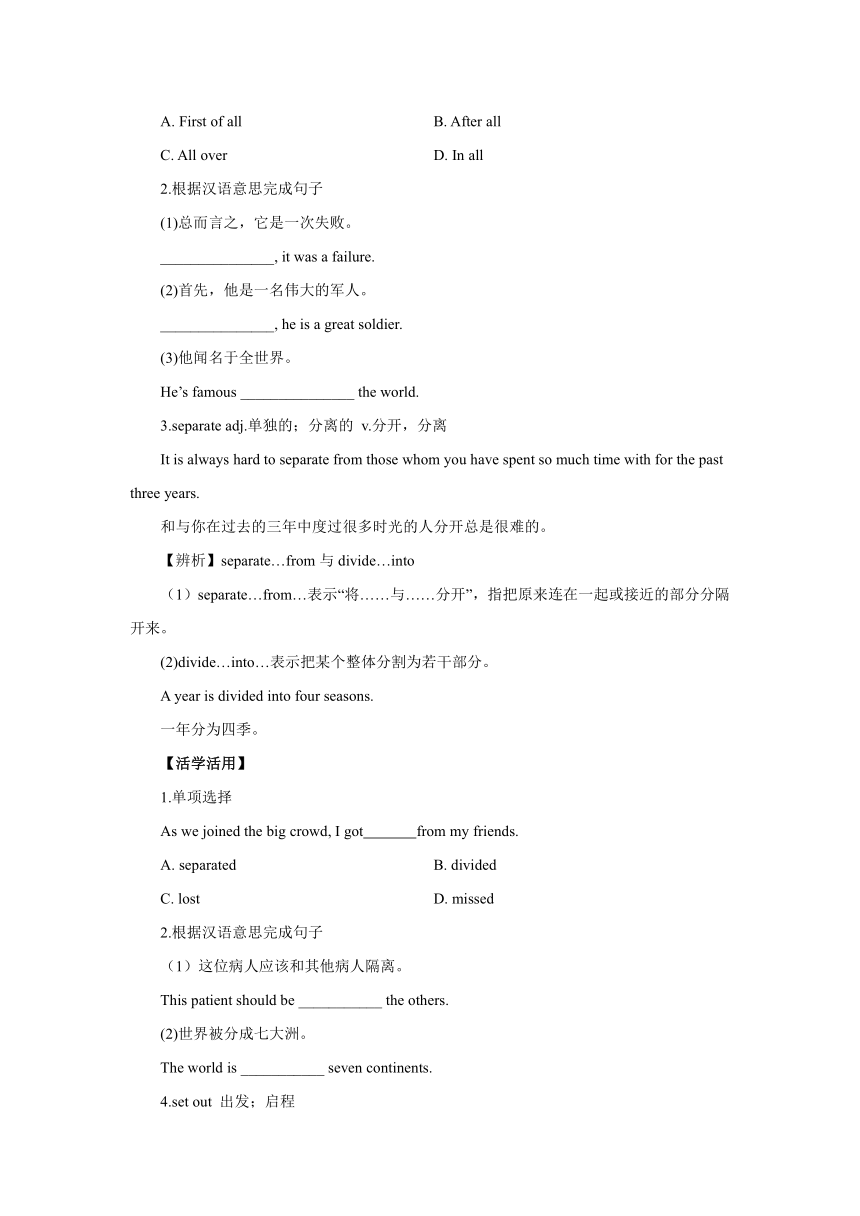人教版九年级英语全册 Unit 14 I remember meeting all of you in Grade 7 Section B (2a-2e)导学案
文档属性
| 名称 | 人教版九年级英语全册 Unit 14 I remember meeting all of you in Grade 7 Section B (2a-2e)导学案 |  | |
| 格式 | docx | ||
| 文件大小 | 20.1KB | ||
| 资源类型 | 教案 | ||
| 版本资源 | 人教新目标(Go for it)版 | ||
| 科目 | 英语 | ||
| 更新时间 | 2022-11-19 14:49:24 | ||
图片预览



文档简介
Unit 14 I remember meeting all of you in Grade 7. Section B(2a-2e)导学案
【学习目标】
1. Words: gentleman, graduation, ceremony, congratulate, thirsty, thankful, lastly, task, ahead, responsible, separate, wing
2. Useful expressions: first of all, be thirsty for, be thankful to sb., ahead of, along with, be responsible for, set out, separate from, first of all, fail to do, be proud of
3. Reading strategies: Quickly read through a text to see what kind of writing it is, who wrote it and why it was written.
【情景导入】
What is the most important thing you have learned in junior high school
设计意图:通过观看一段毕业演讲,引出对你来说初中生活中最重要的收获是什么的话题讨论,进而引出新课内容。
【完成教材2a-2e的任务】
1.要求学生快速默读短文,熟知大意,回答短文前的3个问题。然后邀请几位学生给出自己的答案,全班一起检查讨论。
2.先邀请几位学生阅读短文(可一人一段),教师要注意语音,及时纠正。然后播放录音,全班学生一起跟读。
3.学生再细读短文,回答2c所给的问题。给出5分钟的时限,然后找6位学生回答问题,并集体核对答案。
4.用2d方框中所给单词或短语的适当形式完成句子,全班核对答案。
5.把短文中你喜欢的句子划出来,并告诉你的同学他们是什么意思,你为什么喜欢他们。
【完成教材3a—3b的任务】
1.根据3a的所给问题的提示,想一个在初中永远不会忘记的人或事,列出这个人或这件事是怎样在某方面改变你的生活的。
2.根据3a写的提要以及3b所给的提示,写一篇短文讲述在初中生活中使你难忘的人或事。
设计意图:通过阅读训练任务,培养学生的阅读能力,并让学生学会自己解决问题,在解决问题的过程中将所学知识得以运用。通过小组讨论和写作训练,培养学生的写作技巧和综合运用语言能力。
【词汇点睛】
1.ahead的用法
ahead为副词,意为“向前面”。
(1)用于 ahead of,注意以下用法:
①指时间或空间“在…之前”:
He left one day ahead of me.
他比我早走一天。
②表示“比…强 (高)” (主要用作表语):
He’s ahead of me in English.
他的英语比我强。
③用于 ahead of time,意为“提前”或“提早”:
The work was done ahead of time.
工作提前完成了。
(2)用于 go ahead,注意以下用法:
①表示同意或允许,意为“说吧”、“做吧”
A:May I start 我可以开始了吗
B:Yes, go ahead. 好,开始吧。
②表示继续做某事,意为“继续…吧”
Go ahead, we are all listening.
继续讲吧,我们都在听呢!
2.first of all首先
First of all, I’d like to congratulate all the students who are here today.
首先,我要祝贺今天所有在这儿的学生。
【拓展】all 的相关短语:
all in all总而言之 in all总共;总计
after all毕竟;终究 all over遍及;到处
above all首先;尤其是
【活学活用】
1.单项选择
—Jim, would you please tidy up your room by yourself , you are no longer a child.
—All right, I’m coming.
A. First of all B. After all
C. All over D. In all
2.根据汉语意思完成句子
(1)总而言之,它是一次失败。
_______________, it was a failure.
(2)首先,他是一名伟大的军人。
_______________, he is a great soldier.
(3)他闻名于全世界。
He’s famous _______________ the world.
3.separate adj.单独的;分离的 v.分开,分离
It is always hard to separate from those whom you have spent so much time with for the past three years.
和与你在过去的三年中度过很多时光的人分开总是很难的。
【辨析】separate…from与divide…into
(1)separate…from…表示“将……与……分开”,指把原来连在一起或接近的部分分隔开来。
(2)divide…into…表示把某个整体分割为若干部分。
A year is divided into four seasons.
一年分为四季。
【活学活用】
1.单项选择
As we joined the big crowd, I got from my friends.
A. separated B. divided
C. lost D. missed
2.根据汉语意思完成句子
(1)这位病人应该和其他病人隔离。
This patient should be ___________ the others.
(2)世界被分成七大洲。
The world is ___________ seven continents.
4.set out 出发;启程
As you set out on your new journey, you shouldn’t forget where you came from.
在新的旅行启程之际,不应忘了你来自何处。
They set out to perform the operation.
他们开始动手术。
set out还表示“着手……,开始……”;set out to do sth.表示“着手做某事”。
【活学活用】
1.单项选择
Captain Alison will at eight o’clock, so we shall have plenty of time.
A. beginning B. set out
C. be set out D. be begun
2.根据汉语意思完成句子
(1)他明天动身去北京。
He will ___________ tomorrow on his journey to Beijing.
(2)他什么时候着手写那本小说的?
When did he ___________ write the novel
【句型透视】
1.Thank you for coming today to attend the graduation ceremony at No.3 Junior High School.
感谢你们今天来参加第三中学的毕业典礼。
thank you for(doing) sth.相当于thanks for(doing)sth.,表示“感谢(做)某事”。
Thank you for helping me with my English.
=Thanks for helping me with my English.
感谢你帮助我学习英语。
【活学活用】
(1)Thanks for me with my science.
A. help B. to help C. helping D. your help
(2)—Thanks joining the Talk Show!
—You’re welcome.
A.by B. on C. of D. for
2.But along with difficulties, there will also be many exciting things waiting for you.
但是除困难以外,还会有很多令人兴奋的事情等待着你们。
本句是“There be sb./sth. doing sth.”结构,意为“有某人/某物在做某事”。
There are many people playing in the park.
公园里有很多人在玩儿。
【活学活用】
1.根据汉语意思完成句子
有一些学生正在操场上打篮球。
There ________ some students ________________ on the playground.
2.用括号中所给词的适当形式填空
There is a girl ___________(wait) for you outside.
3.Although you have to go your separate ways now, I hope that in a few years’ time, you’ll come back to visit our school.
虽然现在你们不得不走上不同的道路,但是我希望在几年后,你们能够回来参观我们学校。
(1)although意为“尽管,虽然”,引导让步状语从句。
Although he is a little child, he knows a lot.
虽然他是一个小孩子,但是他知道很多。
(2)that引导的是宾语从句,作动词hope的宾语。
I hope that I can visit the Great Wall some day.
我希望有一天能够去参观长城。
(3)in a few years’ time意为“在几年之后”,是“in+一段时间”结构,在句中作状语,主句使用一般将来时。
I will leave in five hours.五小时后我将离开。
【活学活用】
1.单项选择
(1)I know I promised to take you dinner, but I won’t finish working until ten o’clock.
A. that B. if C. what D. why
(2) he was very tired, he continued working in his office.
A. Since B. Although
C. As soon as D. Because
2.用括号中所给词的适当形式填空
My sister ____________(come) back in a week’s time.
4.It is always hard to separate from those whom you have spent so much time with for the past three years.
和与你在过去的三年中度过很多时光的人分开总是很难的。
本句是“It is +adj.+to do sth.”结构;whom引导的是定语从句,修饰先行词those, whom在定语从句中作with的宾语。
It’s very important for us to learn English well.
对我们来说学好英语很重要。
This is the man whom I talk with yesterday.
这就是昨天我与之谈话的那个人。
【活学活用】
(1)—I often have hamburgers for lunch.
—You’d better not. It’s bad for you too much junk food.
A. eat B. to eat C. eating D. ate
(2)—Do you know the kid with Bob is talking over there
—Yes, it’s my cousin.
A. who B. that C./ D. whom
5.As you set out on your new journey, you shouldn’t forget where you came from.
在新的旅行启程之前,不应忘了你来自何处。
(1)set out on something意思是“开始进行新的或重要的事情”。
When we set out on this project, we knew it would be difficult.
我们开始着手这个项目时就知道它的难处。
(2)set out是一个常用短语,表示“出发“。
After a three-day rest, the travelers set out again.
这些旅行者休息三天后又出发了。
(3)journey的本义是“旅程”,此句里用的是它的引申义,即它的隐喻用法,意思是“(人生的)阶段或行程”。
Learning is a life-long journey.
学习是终身旅程。
【学习目标】
1. Words: gentleman, graduation, ceremony, congratulate, thirsty, thankful, lastly, task, ahead, responsible, separate, wing
2. Useful expressions: first of all, be thirsty for, be thankful to sb., ahead of, along with, be responsible for, set out, separate from, first of all, fail to do, be proud of
3. Reading strategies: Quickly read through a text to see what kind of writing it is, who wrote it and why it was written.
【情景导入】
What is the most important thing you have learned in junior high school
设计意图:通过观看一段毕业演讲,引出对你来说初中生活中最重要的收获是什么的话题讨论,进而引出新课内容。
【完成教材2a-2e的任务】
1.要求学生快速默读短文,熟知大意,回答短文前的3个问题。然后邀请几位学生给出自己的答案,全班一起检查讨论。
2.先邀请几位学生阅读短文(可一人一段),教师要注意语音,及时纠正。然后播放录音,全班学生一起跟读。
3.学生再细读短文,回答2c所给的问题。给出5分钟的时限,然后找6位学生回答问题,并集体核对答案。
4.用2d方框中所给单词或短语的适当形式完成句子,全班核对答案。
5.把短文中你喜欢的句子划出来,并告诉你的同学他们是什么意思,你为什么喜欢他们。
【完成教材3a—3b的任务】
1.根据3a的所给问题的提示,想一个在初中永远不会忘记的人或事,列出这个人或这件事是怎样在某方面改变你的生活的。
2.根据3a写的提要以及3b所给的提示,写一篇短文讲述在初中生活中使你难忘的人或事。
设计意图:通过阅读训练任务,培养学生的阅读能力,并让学生学会自己解决问题,在解决问题的过程中将所学知识得以运用。通过小组讨论和写作训练,培养学生的写作技巧和综合运用语言能力。
【词汇点睛】
1.ahead的用法
ahead为副词,意为“向前面”。
(1)用于 ahead of,注意以下用法:
①指时间或空间“在…之前”:
He left one day ahead of me.
他比我早走一天。
②表示“比…强 (高)” (主要用作表语):
He’s ahead of me in English.
他的英语比我强。
③用于 ahead of time,意为“提前”或“提早”:
The work was done ahead of time.
工作提前完成了。
(2)用于 go ahead,注意以下用法:
①表示同意或允许,意为“说吧”、“做吧”
A:May I start 我可以开始了吗
B:Yes, go ahead. 好,开始吧。
②表示继续做某事,意为“继续…吧”
Go ahead, we are all listening.
继续讲吧,我们都在听呢!
2.first of all首先
First of all, I’d like to congratulate all the students who are here today.
首先,我要祝贺今天所有在这儿的学生。
【拓展】all 的相关短语:
all in all总而言之 in all总共;总计
after all毕竟;终究 all over遍及;到处
above all首先;尤其是
【活学活用】
1.单项选择
—Jim, would you please tidy up your room by yourself , you are no longer a child.
—All right, I’m coming.
A. First of all B. After all
C. All over D. In all
2.根据汉语意思完成句子
(1)总而言之,它是一次失败。
_______________, it was a failure.
(2)首先,他是一名伟大的军人。
_______________, he is a great soldier.
(3)他闻名于全世界。
He’s famous _______________ the world.
3.separate adj.单独的;分离的 v.分开,分离
It is always hard to separate from those whom you have spent so much time with for the past three years.
和与你在过去的三年中度过很多时光的人分开总是很难的。
【辨析】separate…from与divide…into
(1)separate…from…表示“将……与……分开”,指把原来连在一起或接近的部分分隔开来。
(2)divide…into…表示把某个整体分割为若干部分。
A year is divided into four seasons.
一年分为四季。
【活学活用】
1.单项选择
As we joined the big crowd, I got from my friends.
A. separated B. divided
C. lost D. missed
2.根据汉语意思完成句子
(1)这位病人应该和其他病人隔离。
This patient should be ___________ the others.
(2)世界被分成七大洲。
The world is ___________ seven continents.
4.set out 出发;启程
As you set out on your new journey, you shouldn’t forget where you came from.
在新的旅行启程之际,不应忘了你来自何处。
They set out to perform the operation.
他们开始动手术。
set out还表示“着手……,开始……”;set out to do sth.表示“着手做某事”。
【活学活用】
1.单项选择
Captain Alison will at eight o’clock, so we shall have plenty of time.
A. beginning B. set out
C. be set out D. be begun
2.根据汉语意思完成句子
(1)他明天动身去北京。
He will ___________ tomorrow on his journey to Beijing.
(2)他什么时候着手写那本小说的?
When did he ___________ write the novel
【句型透视】
1.Thank you for coming today to attend the graduation ceremony at No.3 Junior High School.
感谢你们今天来参加第三中学的毕业典礼。
thank you for(doing) sth.相当于thanks for(doing)sth.,表示“感谢(做)某事”。
Thank you for helping me with my English.
=Thanks for helping me with my English.
感谢你帮助我学习英语。
【活学活用】
(1)Thanks for me with my science.
A. help B. to help C. helping D. your help
(2)—Thanks joining the Talk Show!
—You’re welcome.
A.by B. on C. of D. for
2.But along with difficulties, there will also be many exciting things waiting for you.
但是除困难以外,还会有很多令人兴奋的事情等待着你们。
本句是“There be sb./sth. doing sth.”结构,意为“有某人/某物在做某事”。
There are many people playing in the park.
公园里有很多人在玩儿。
【活学活用】
1.根据汉语意思完成句子
有一些学生正在操场上打篮球。
There ________ some students ________________ on the playground.
2.用括号中所给词的适当形式填空
There is a girl ___________(wait) for you outside.
3.Although you have to go your separate ways now, I hope that in a few years’ time, you’ll come back to visit our school.
虽然现在你们不得不走上不同的道路,但是我希望在几年后,你们能够回来参观我们学校。
(1)although意为“尽管,虽然”,引导让步状语从句。
Although he is a little child, he knows a lot.
虽然他是一个小孩子,但是他知道很多。
(2)that引导的是宾语从句,作动词hope的宾语。
I hope that I can visit the Great Wall some day.
我希望有一天能够去参观长城。
(3)in a few years’ time意为“在几年之后”,是“in+一段时间”结构,在句中作状语,主句使用一般将来时。
I will leave in five hours.五小时后我将离开。
【活学活用】
1.单项选择
(1)I know I promised to take you dinner, but I won’t finish working until ten o’clock.
A. that B. if C. what D. why
(2) he was very tired, he continued working in his office.
A. Since B. Although
C. As soon as D. Because
2.用括号中所给词的适当形式填空
My sister ____________(come) back in a week’s time.
4.It is always hard to separate from those whom you have spent so much time with for the past three years.
和与你在过去的三年中度过很多时光的人分开总是很难的。
本句是“It is +adj.+to do sth.”结构;whom引导的是定语从句,修饰先行词those, whom在定语从句中作with的宾语。
It’s very important for us to learn English well.
对我们来说学好英语很重要。
This is the man whom I talk with yesterday.
这就是昨天我与之谈话的那个人。
【活学活用】
(1)—I often have hamburgers for lunch.
—You’d better not. It’s bad for you too much junk food.
A. eat B. to eat C. eating D. ate
(2)—Do you know the kid with Bob is talking over there
—Yes, it’s my cousin.
A. who B. that C./ D. whom
5.As you set out on your new journey, you shouldn’t forget where you came from.
在新的旅行启程之前,不应忘了你来自何处。
(1)set out on something意思是“开始进行新的或重要的事情”。
When we set out on this project, we knew it would be difficult.
我们开始着手这个项目时就知道它的难处。
(2)set out是一个常用短语,表示“出发“。
After a three-day rest, the travelers set out again.
这些旅行者休息三天后又出发了。
(3)journey的本义是“旅程”,此句里用的是它的引申义,即它的隐喻用法,意思是“(人生的)阶段或行程”。
Learning is a life-long journey.
学习是终身旅程。
同课章节目录
- Unit 1 How can we become good learners.
- Section A
- Section B
- Unit 2 I think that mooncakes are delicious!
- Section A
- Section B
- Unit 3 Could you please tell me where the restroom
- Section A
- Section B
- Unit 4 I used to be afraid of the dark.
- Section A
- Section B
- Unit 5 What are the shirts made of?
- Section A
- Section B
- Review of Units 1-5
- Unit 6 When was it invented?
- Section A
- Section B
- Unit 7 Teenagers should be allowed to choose their
- Section A
- Section B
- Unit 8 It must belong to Carla.
- Section A
- Section B
- Unit 9 I like music that I can dance to.
- Section A
- Section B
- Unit 10 You're supposed to shake hands.
- Section A
- Section B
- Review of Units 6-10
- Unit 11 Sad movies make me cry.
- Section A
- Section B
- Unit 12 Life is full of the unexpected
- Section A
- Section B
- Unit 13 We're trying to save the earth!
- Section A
- Section B
- Unit 14 I remember meeting all of you in Grade 7.
- Section A
- Section B
- Review of Units 11-14
